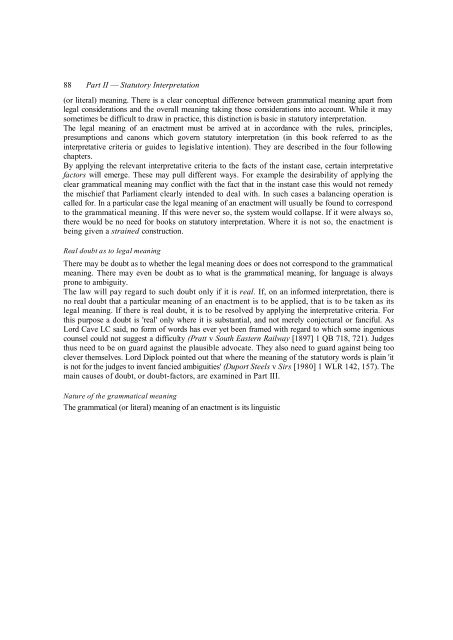Statutory Interpretation The Technique of Statutory ... - Francis Bennion
Statutory Interpretation The Technique of Statutory ... - Francis Bennion
Statutory Interpretation The Technique of Statutory ... - Francis Bennion
You also want an ePaper? Increase the reach of your titles
YUMPU automatically turns print PDFs into web optimized ePapers that Google loves.
88 Part II — <strong>Statutory</strong> <strong>Interpretation</strong><br />
(or literal) meaning. <strong>The</strong>re is a clear conceptual difference between grammatical meaning apart from<br />
legal considerations and the overall meaning taking those considerations into account. While it may<br />
sometimes be difficult to draw in practice, this distinction is basic in statutory interpretation.<br />
<strong>The</strong> legal meaning <strong>of</strong> an enactment must be arrived at in accordance with the rules, principles,<br />
presumptions and canons which govern statutory interpretation (in this book referred to as the<br />
interpretative criteria or guides to legislative intention). <strong>The</strong>y are described in the four following<br />
chapters.<br />
By applying the relevant interpretative criteria to the facts <strong>of</strong> the instant case, certain interpretative<br />
factors will emerge. <strong>The</strong>se may pull different ways. For example the desirability <strong>of</strong> applying the<br />
clear grammatical meaning may conflict with the fact that in the instant case this would not remedy<br />
the mischief that Parliament clearly intended to deal with. In such cases a balancing operation is<br />
called for. In a particular case the legal meaning <strong>of</strong> an enactment will usually be found to correspond<br />
to the grammatical meaning. If this were never so, the system would collapse. If it were always so,<br />
there would be no need for books on statutory interpretation. Where it is not so, the enactment is<br />
being given a strained construction.<br />
Real doubt as to legal meaning<br />
<strong>The</strong>re may be doubt as to whether the legal meaning does or does not correspond to the grammatical<br />
meaning. <strong>The</strong>re may even be doubt as to what is the grammatical meaning, for language is always<br />
prone to ambiguity.<br />
<strong>The</strong> law will pay regard to such doubt only if it is real. If, on an informed interpretation, there is<br />
no real doubt that a particular meaning <strong>of</strong> an enactment is to be applied, that is to be taken as its<br />
legal meaning. If there is real doubt, it is to be resolved by applying the interpretative criteria. For<br />
this purpose a doubt is 'real' only where it is substantial, and not merely conjectural or fanciful. As<br />
Lord Cave LC said, no form <strong>of</strong> words has ever yet been framed with regard to which some ingenious<br />
counsel could not suggest a difficulty (Pratt v South Eastern Railway [1897] 1 QB 718, 721). Judges<br />
thus need to be on guard against the plausible advocate. <strong>The</strong>y also need to guard against being too<br />
clever themselves. Lord Diplock pointed out that where the meaning <strong>of</strong> the statutory words is plain 'it<br />
is not for the judges to invent fancied ambiguities' (Duport Steels v Sirs [1980] 1 WLR 142, 157). <strong>The</strong><br />
main causes <strong>of</strong> doubt, or doubt-factors, are examined in Part III.<br />
Nature <strong>of</strong> the grammatical meaning<br />
<strong>The</strong> grammatical (or literal) meaning <strong>of</strong> an enactment is its linguistic

















